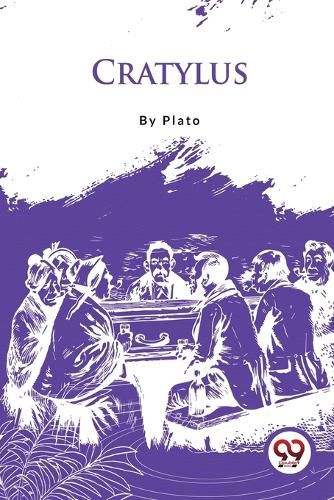Readings Newsletter
Become a Readings Member to make your shopping experience even easier.
Sign in or sign up for free!
You’re not far away from qualifying for FREE standard shipping within Australia
You’ve qualified for FREE standard shipping within Australia
The cart is loading…






This title is printed to order. This book may have been self-published. If so, we cannot guarantee the quality of the content. In the main most books will have gone through the editing process however some may not. We therefore suggest that you be aware of this before ordering this book. If in doubt check either the author or publisher’s details as we are unable to accept any returns unless they are faulty. Please contact us if you have any questions.
Plato's conversation is known as Cratylus (Ancient Greek: Kratylos). In it, Socrates is questioned about whether names are ""conventional"" or ""natural,"" or if language is merely a set of random signals, or if words have an essential connection to the things they symbolize. The majority of contemporary academics concur that it was mostly composed during Plato's supposedly middle era. As an artist employs color to convey the core of his topic in a painting, Socrates compares the production of a word to the labor of an artist in Cratylus. The best way to talk is to use names that are similar to the things they name (that is, names that are appropriate for them), and the worst way to speak is to use names that are not like the things they name. According to one theory, names have developed owing to tradition and convention, thus individuals who use them can replace them with something unrelated. The opposite approach holds that names come about because they express the essence of their topic. Many of the terms that Socrates gives as examples may have originated from a concept that was formerly associated with the name, but they have since evolved.
$9.00 standard shipping within Australia
FREE standard shipping within Australia for orders over $100.00
Express & International shipping calculated at checkout
This title is printed to order. This book may have been self-published. If so, we cannot guarantee the quality of the content. In the main most books will have gone through the editing process however some may not. We therefore suggest that you be aware of this before ordering this book. If in doubt check either the author or publisher’s details as we are unable to accept any returns unless they are faulty. Please contact us if you have any questions.
Plato's conversation is known as Cratylus (Ancient Greek: Kratylos). In it, Socrates is questioned about whether names are ""conventional"" or ""natural,"" or if language is merely a set of random signals, or if words have an essential connection to the things they symbolize. The majority of contemporary academics concur that it was mostly composed during Plato's supposedly middle era. As an artist employs color to convey the core of his topic in a painting, Socrates compares the production of a word to the labor of an artist in Cratylus. The best way to talk is to use names that are similar to the things they name (that is, names that are appropriate for them), and the worst way to speak is to use names that are not like the things they name. According to one theory, names have developed owing to tradition and convention, thus individuals who use them can replace them with something unrelated. The opposite approach holds that names come about because they express the essence of their topic. Many of the terms that Socrates gives as examples may have originated from a concept that was formerly associated with the name, but they have since evolved.